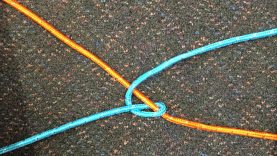
The Path from OCD to Freedom and Peace
Most people recognize the term OCD (Obsessive Compulsive Disorder); however, most people generally associate the OCD label with people who like things neat, tidy, and orderly.
While this may be true for some individuals who suffer from OCD, it goes far beyond a personality quirk.
If you or someone you love has been diagnosed with OCD, you understand it is an everyday battle.
No matter what the individual obsesses over, the compulsions take over his or her life.
One student may not be able to complete a test.
Another person may not be able to work in a corporate setting.
A different individual may doubt their salvation day in and day out.
Michael R. Emlet explains, “The essential features of OCD include recurrent obsessions and/or compulsions that are severe enough to be time-consuming or to cause marked distress or significant impairment in a person’s daily routine.”
For those who suffer from OCD or love someone who does, there is hope. To help us find the path from OCD to freedom and peace, we are using OCD: Freedom for the Obsessive-Compulsive by Michael R. Emlet.
What is OCD?
According to The Recovery Village, “Obsessive-compulsive disorder (OCD) affects 2–3% of the population. […] Current obsessive-compulsive disorder statistics indicate that 1 in 40 adults in the U.S. have OCD. Reports show that OCD can affect children as young as five years old.”
Chances are you know someone who suffers from this mental health issue, or you might be the one who suffers from obsessive-compulsive disorder.
Before we move on, it’s important to explain what OCD is (especially since popular culture tends to use OCD as a punchline).
Emlet defines, “Obsessions are persistent ideas, thoughts, impulses, or images that are experienced as intrusive and inappropriate and cause marked anxiety or distress. These ideas, thoughts, impulses, or images are not simply excessive worries about actual problems (with things like finances, work, or school). The individual with an obsession experiences anxiety and attempts to suppress such thoughts or impulses or neutralize them with another thought or action (that is, a compulsion). The person with an obsession is distressed by its presence; it is an unwanted intrusion into his thought life.”
For example, fear that someone may get salmonella causes her to obsess over it, which she tries to suppress by cleaning the countertops repeatedly.
Or a man may feel guilty about a thought he had and feels like he needs to confess his “potential sin,” and say, “I’m sorry” three times in a row to self-atone.
Recognize OCD Results in Bondage
Ultimately, those who suffer from OCD live in bondage and become slaves to their thoughts and compulsions.
In Desiring God, Johnathon Bowers writes, “Compulsions offer the prospect of relief from obsessive thoughts. But they almost never deliver. In fact, more often than not, they only make things worse. (Are you sure your hands are clean? Better scrub again.)”
Obsessions followed by compulsions become a never-ending loop because the compulsions are never enough.
The Biblical Counseling Coalition explains, “OCD is a unique form of legalistic slavery that the sufferer chooses. The individual lives through endless rounds of fears and rituals and is a slave to them. […] The Christian who struggles with OCD must choose to deal with the problem in several areas to escape the slavery. They must decide whether or not their obsessions are real or untrue. They will need to enlist the help of others to stand alongside them to help them see the difference. Then, they must move their thinking to ‘whatever is true,’ as Paul told the Philippians. (Phil. 4:8)”
Understand the Physical and the Spiritual
Sometimes people bristle when they hear suggestions that OCD can be linked to sin.
This is especially troubling for those who suffer from a form of religious OCD.
However, it is important to note that God designed our hearts and bodies. We are both physical and spiritual beings.
OCD tends to affect both, which is why we must recognize both rather than emphasizing one over the other.
Family Life suggests, “To understand your struggles with OCD you need to take into account both the body (brain) component and the spiritual (heart) component. If you focus exclusively on the possible physical components of OCD, you will miss the spiritual roots of OCD and not be able to live out the call to ‘take every thought captive’ for the glory of Christ (2 Corinthians 10:5). If you focus exclusively on the spiritual origins of OCD, you may underestimate the intensity of the struggle, experience unnecessary guilt, and unthinkingly condemn the use of medications to improve symptoms in yourself and others.”
To move from OCD towards freedom and peace, you must pay attention to the heart of the matter.
Get to the Heart of the Matter
OCD involves both obsessive thoughts and compulsions. While brain-based influences certainly play a role in OCD, the individual must be willing to identify the motivations behind it.
Family Life explains, “Your desires, thoughts, and actions are revealing what you are really worshipping—what is most important to you and what you treasure above all else. Jesus says, ‘For where your treasure is, there your heart will be also’ (Matthew 6:21, ESV). So what are the things that OCD strugglers typically value or ‘treasure?’”
For example, Emlet explains how OCD is also known as “the doubting disease.”
Many of those suffering from OCD treasure a need for certainty.
Emlet writes, “People with OCD characteristically doubt what they see with their own eyes, so they attempt to control the environment (the checking ritual) to erase the doubt and be certain. Thus, the need for certainty is tied to the demand for control or mastery.”
Here are some of the other heart matters Emlet names:
- The need for certainty
- The need for order
- The expectation of perfection
- Guilt
- The fear of man
It is important to note these behaviors may not be sinful, but they can enter sin territory depending on the individual’s response.
Strive for an Outward Focused Life
OCD tends to be inward-focused.
What did I do?
What could I do?
What have I done?
According to Emlet, “The issue is more clearly a sinful struggle when the desire to be sure becomes a demanding tyrant that generates anxiety and disrupts the Godward and others-centered focus that Scriptures would have for us.”
If the sufferer’s response causes them to move inward and prevents them from looking outward, there is potential for sin. Instead, focus outward.
Family Life suggests, “Focus on the fact that God gives you good works to do each day, and seek them out (Ephesians 2:10). Then your life will have an outward focus on God and others, instead of an inward focus on your struggle with OCD. As you choose to act in love toward others rather than act out your compulsion, you will find the power of the obsessive-compulsive cycle loosened.”
Let Go and Trust God
For an OCD struggler, doubt is a major issue.
However, one way to move towards freedom and peace is to simply accept you will always have doubts.
Only God knows all things.
Emlet writes, “Freedom begins to come as the OCD sufferer gives up the need to control his anxiety and his world and casts himself upon the grace and providential care of God. […] Safety is not found in my own reasoning process or ritual. I am called to live responsibly before God, but I don’t have ultimate responsibility or oversight of my life.”
Remember who God is and trust in his faithfulness.
Accept You are Capable of Worse
Guilt can be a major issue for those struggling with OCD.
It is one of the reasons they try to assuage their feelings with compulsions.
They are constantly striving to self-atone rather than accepting Christ’s forgiveness.
Emlet says, “The fact of the matter is, apart from the sustaining grace of Christ, I am capable of atrocities far worse than any that have entered my mind. […] Church planter and seminary professor Jack Miller coined the phrase, ‘Cheer up, you’re worse than you think,’ to undermine the self-righteousness of someone who continues to wallow in his sin – in our case, potential sin – and refuses to grab hold of the righteousness of Christ.”
Seek Help
OCD can be a debilitating problem.
If you or someone you love suffers from OCD, there is hope.
The sufferer does not have to live in bondage to his or her thoughts and compulsions.
Seek help from biblical counselors who will help move the sufferer towards peace.









